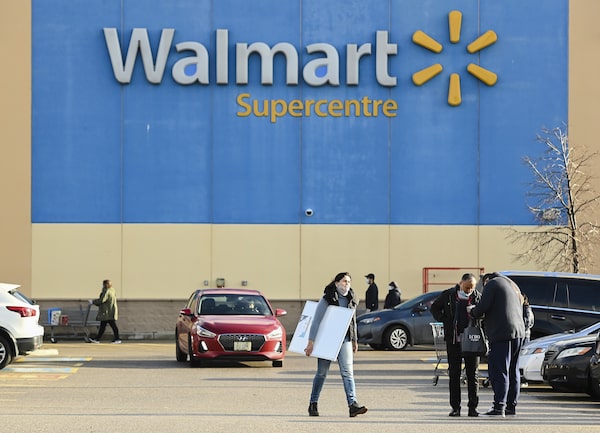
People leave the Walmart after shopping during the COVID-19 pandemic in Mississauga, Ont., Thursday, Nov. 26, 2020.Nathan Denette/The Canadian Press
The new president and chief executive officer of Walmart Canada told Members of Parliament that his stores are not profiting from inflation – and that the company’s profits from food decreased last year – but declined to provide numbers to back up those assertions.
Gonzalo Gebara’s appearance on Monday evening before the House of Commons committee on agriculture and agri-food followed another hearing earlier this month, during which MPs pressed the leaders of the largest Canadian-owned grocery chains to explain the rapidly rising cost of food and growing profits among retailers.
“I know that our customers and all Canadians are feeling the pain from inflation. That’s why I want to state clearly, Walmart Canada is not attempting to profit from these inflationary conditions,” said Mr. Gebara, who has been with Walmart for more than 20 years and took over the top job at Walmart Canada two months ago.
Grocery prices have been rising at the highest rate in almost four decades, outpacing the general rate of inflation and making basic necessities less affordable for Canadians. Last week, Statistics Canada reported that the annual inflation rate fell to 5.2 per cent in February, while grocery prices continued to rise more sharply, by 10.6 per cent on a 12-month bases. It was the seventh consecutive month that food prices saw double-digit increases.
Mr. Gebara told MPs that Walmart Canada’s gross profits decreased last year compared to the year before, even as sales grew largely because of inflation. But when pressed about the specifics of Walmart’s profits here, Mr. Gebara demurred, saying that information is competitively sensitive.
That caused some MPs to raise concerns about Walmart’s transparency. NDP MP Alistair MacGregor told Mr. Gebara that Canadians are experiencing a “crisis of trust” in the grocery sector. Mr. Gebara replied that the company has provided “relevant” financial information to the federal Competition Bureau as part of its study of the industry.
Like other grocery CEOs, Mr. Gebara reiterated the message that food inflation is a complex problem that is driven by increasing costs at multiple points in the food supply chain, with product producers, processors and other suppliers also passing along higher prices for their goods.
But some MPs countered that Walmart has contributed to the increasing cost of doing business by introducing new fees that it charges to suppliers. The fees, which the retailer imposed in 2020, are charged as a percentage on the cost of goods Walmart purchases. They were designed to help offset a five-year, $3.5-billion investment in its stores and e-commerce network that the company announced that year, and are ongoing now.
The move helped to spur industry group representing food producers and smaller retailers to renew calls for a code of conduct for the industry. More than two years later, a steering committee of industry groups has developed a draft of a self-regulatory code that they are hoping to implement, and which is now being circulated among companies across the industry.
Walmart has not participated in the negotiations around creating a proposed code – Mr. Gebara’s predecessor, Horacio Barbeito, opposed its implementation.
“I acknowledge that in the past we didn’t participate, but we are willing to participate now,” Mr. Gebara said of the discussions on the code. He added that the company is currently reviewing the draft.
“We would support any initiative that would bring better conditions and the ability to have more transparency in the whole chain,” he told the committee. “…As long as it’s the good thing for consumers, we will support it.”